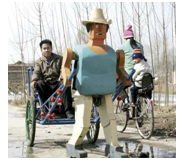
题目列表(包括答案和解析)
根据所给首字母或汉语提示及句意写出下列单词,使句子意义通顺。
1.My favorite music is w_____________ music.It’s different from Chinese music.
2.His family is poor,but I_________,he can go to school with the help of a kind man.
3.There are the earth,the sun,the moon and many other stars in the u_________.
4.Listening to the radio in English every day can i_________ your English.
5.He is not good at English,please give him some a_______________.
6.I was waiting for the bus when ____________ (突然) it began to rain.
7.Vienna is the capital city of Austria and the ________(中心) of European classical music.
8.I’ve never won any travel ________(比赛).
9.We had a very fantastic ____________ (经历)in Hainan Island last summer.
10.We all _______ (欢呼) when Liu Xiang took the first prize in the race.
| 完形填空 | ||||
| 阅读下列短文,选择可以填入空白处的最佳选项。 | ||||
| The 50-year-old farmer (农民), Wu Yulu is quite different from the others at his village. He is the 1 of 38 handmade robots. He has been 2 to show his robots at the opening ceremony of the Shanghai World Expo. Born in a 3 family, he did not have the opportunity to go to school. But even as a child, he knew he wanted to make machines. “I think 4 machines is a talent I was born with,” he said.In 1987, he finally finished his 5 robot that could walk like a man. He named it “Wu No. 1.” 6 , his experiments (实验) have not been without danger. One of his fingers was injured in 1989. And in 1999, his house was 7 by fire. In 2003, Wu and his robots were invited to perform in the Great Hall of the People in Beijing, and in 2009, his robots were on 8 along with the Chinese Shenzhou spaceships.Wu's latest dream is to invent robots 9 can help people in daily life. He will invent robots to help the disabled or look 10 children. | ||||
 | ||||
|
听力理解(本大题共30小题,每小题1分,共30分)
Ⅰ)听对话,选择与所听句子意思相同的图片。每小题读两遍。
1.
A.
B.
C.
2.
A.
B.
C.
3.
A.
B.
C.
4.
A.
B.
C.
5.
A.
B.
C.
Ⅱ)听句子,选出最佳的应答句。每小题读一遍。
6.
A.He is thirty.
B.He is a teacher.
C.He is my English teacher.
7.
A.What's your name?
B.Welcome to our class.
C.Hello!
8.
A.Fine, thank you.
B.How do you do?
C.I work very hard.
9.
A.See you.
B.Good night.
C.Goodbye.
10.
A.Thanks, but it's just so-so.
B.Thanks.
C.No, it isn't.
Ⅲ)听对话,根据对话内容选出正确答案。每段对话读两遍。
11.Who is the girl waiting for?
A.Her friend.
B.Her mother.
C.Her father.
12.What will the girl do this evening?
A.Go to the party.
B.Do her homework.
C.She is not sure.
13.Who does the man want to see?
A.The woman.
B.Mrs.Brown.
C.Mr.Brown.
14.Why can't the man go to the birthday party?
A.He is ill.
B.He is busy.
C.He will go to Shanghai.
15.What do we know about the new teacher?
A.He often keeps silent.
B.He talks too much.
C.He is not very well.
Ⅳ)听下面三段材料,根据所听内容从所给答案中选出最佳答案。每段材料读两遍。
听第16段材料,完成第16、17题。
16.Who is the girl looking for?
A.Her father.
B.Her teacher.
C.Her mother.
17.What color is the hat?
A.Blue.
B.White.
C.Blue and white.
听第17段材料,完成第18至20题。
18.What is Tom doing?
A.He is doing his homework.
B.He is having lunch outside.
C.He is phoning his friend.
19.When does the man want Tom to see him?
A.At seven in the evening.
B.At five in the evening.
C.At four in the afternoon.
20.Where is the man going to see Tom?
A.At his office.
B.At his home.
C.At the school gate.
听第18段材料,完成第21至25题。
21.What does Santa Claus do on Christmas Eve?
A.He gives money to poor people.
B.He brings gifts to everyone.
C.He helps people with their housework.
22.How is Santa Claus usually dressed?
A.In black clothes.
B.In red clothes.
C.In white clothes.
23.What do we know about Santa Nicholas?
A.He lived in Britain.
B.He was from a poor family.
C.He wanted to help people.
24.Why did Nicholas climb onto the roofs to give money to poor people?
A.He didn't want people to know about it.
B.His father didn't want him to help others.
C.Those poor people didn't like him.
25.What kind of person is Nicholas according to the passage?
A.He was very kind.
B.He was very sad.
C.He was very strong.
V)听短文,根据短文内容填表格。短文读两遍。

湖北省互联网违法和不良信息举报平台 | 网上有害信息举报专区 | 电信诈骗举报专区 | 涉历史虚无主义有害信息举报专区 | 涉企侵权举报专区
违法和不良信息举报电话:027-86699610 举报邮箱:58377363@163.com